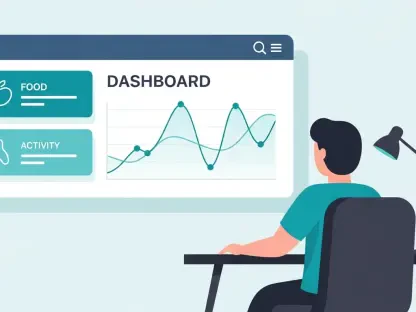In the modern digital landscape, health trackers have become significant tools for those seeking to monitor and improve their well-being. These devices, including smart rings, sleep apps, continuous glucose monitors, and smartwatches, offer unprecedented insight into personal health metrics. While they promise the potential for enhanced health awareness and improvement, questions arise about their psychological impact. As they grow in popularity, concerns surface about whether the constant stream of data they provide might induce anxiety rather than alleviate health concerns. The tension between these benefits and potential drawbacks provides a rich area for exploration, prompting examinations of how demographic factors, user approach, and device functionality influence the experience of using health trackers.
The Duality of Health Tracker Use: Beyond the Data
Health trackers, with their cutting-edge technology, embody a dual nature that intrigues many modern users. On one hand, these devices present opportunities for improved health management by offering detailed information about vital signs, physical activity, and sleep patterns. This data allows for more informed lifestyle decisions, potentially leading to healthier habits and, ultimately, better well-being. On the other hand, the ceaseless influx of information can overwhelm users, causing undue stress. This scenario is especially prevalent among those prone to anxiety about their health, as they may become fixated on fluctuating health metrics and perceive them as alarming indicators.
The psychological impact of health trackers emerges as a key concern, particularly when users misinterpret the complex data. For many individuals, continuous health feedback can transform into a source of anxiety, where wearables become stressors rather than aiding tools. Concerns about unknown terminologies or unexpected results can create scenarios where data is seen as declaring definitive health outcomes. This perception leads to an important discussion on how one should engage with such data responsibly. Guidance and education about interpreting health metrics might assist in alleviating anxiety. However, the responsibility often rests on users to balance the insights provided with realistic understandings of their health.
Demographic Influences and Misinterpretations
A deeper dive into demographic nuances reveals a complex landscape influencing how people interact with health trackers. Evidence points to particular groups, such as younger women, displaying a heightened susceptibility to health anxiety stemming from wearable technology. This susceptibility can often be attributed to a lack of understanding about the relative nature and limits of the data they receive. By equipping users—especially those vulnerable to anxiety—with better interpretative tools, they might view health metrics more as supportive aids rather than absolute measures of health status.
Historical parallels demonstrate that fears surrounding health-related anxiety are not unique to our time, yet they have evolved with technological advancements. From the “glass delusion” of past centuries to the recent rise in hypochondria fueled by readily available health information, history repeats itself in different forms. Acknowledging this persistent trend underscores the importance of equipping users with critical thinking tools when interpreting data from health trackers. The focus should shift from blind trust in technology to educated engagement, recognizing that these devices are most beneficial when integrated thoughtfully into broader health management strategies.
Benefits of Responsible Health Tracker Usage
Despite potential pitfalls, health trackers can play an essential supporting role in personal wellness when utilized thoughtfully. By providing users with real-time data, these devices foster greater self-awareness and may promote positive behavioral changes. For instance, users can identify patterns related to sleep, exercise, and dietary habits that are beneficial or detrimental to their health. Specifically, sleep tracking features can encourage better sleep hygiene by revealing areas for improvement and offering practical solutions, while fitness tracking can motivate individuals to maintain or increase their physical activity through goal-setting.
Furthermore, responsible usage involves understanding that health trackers are capable of alerting users to anomalies, potentially serving as early indicators of more significant health issues. Numerous accounts exist where these devices have identified irregularities ahead of clinical diagnoses, underlining their potential life-saving capabilities. Thus, health trackers provide opportunities for preventive care, empowering users to initiate timely healthcare decisions. However, for these positive outcomes to be realized, users must approach these technologies with a balanced mindset, integrating data insights without becoming beholden to them.
Addressing Skepticism and Evolving Capabilities
Skepticism surrounding health trackers often centers on their reliability and the applicability of the data they collect. While some anecdotes tout their accuracy in detecting emergent health conditions, questions about data precision and usefulness linger. These concerns are valid, as wearables do not replace professional medical advice but instead serve as complementary tools for health monitoring. Therefore, focusing on their potential rather than their limitations can inspire more practical use cases and expand their adoption among more cautious individuals.
Recent advancements in wearable technology hint at an exciting trajectory that extends beyond current capabilities. Innovations have started further integrating trackers with other healthcare technologies, creating cohesive health ecosystems. This evolution invites exploration into how wearables might be adapted to form parts of comprehensive user-centered health plans. Such advancements could lead to more personalized and effective health management, moving trackers beyond tools of mere observation to dynamic facilitators of health and well-being.
Propelling Forward: A Balanced Path to Well-Being
In contemplating the future of health trackers, the balance between enhancing well-being and managing concerns about anxiety emerges as paramount. Health trackers, by design, are tools intended to inform and support users on their wellness journeys. Addressing fears linked to health anxiety calls for continuous refinement of health tracker interfaces to promote easier comprehension and ensure data is not overwhelming. Developers must consider implementing features such as notifications designed to mitigate anxiety by contextualizing results within broader health patterns.
Ultimately, a user-centered focus is required for the sustained success of these technologies. Teaching users how to harness the insights health trackers provide—rather than being overwhelmed by them—could facilitate positive health behavior modifications. This enhancement ensures health trackers serve as allies in cultivating a healthier lifestyle. The commitment to an informational balance reassures users that these devices can play a critical role in a healthier future without sacrificing mental well-being, providing peace of mind as part of their daily routines.









